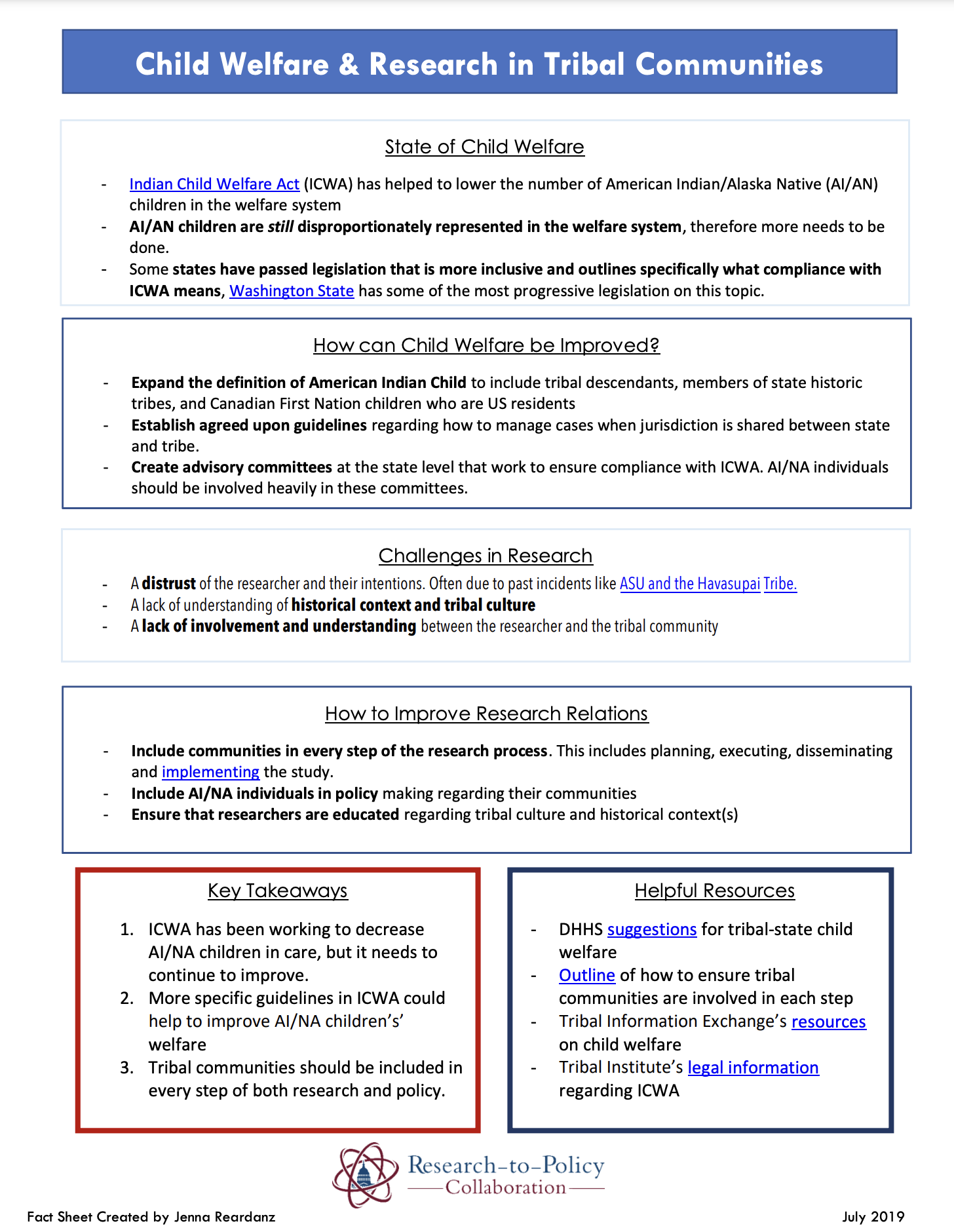
State of Child Welfare
- Indian Child Welfare Act (ICWA) has helped to lower the number of American Indian/Alaskan Natives (AI/AN) children in the welfare system.
- AI/AN children are still disproportionately represented in the welfare system, therefore more needs to be done.
- Some states have passed legislation that is more inclusive and outlines specifically what compliance with ICWA means. Washington state has some of the most progressive legislation on this topic.
How can Child Welfare be Improved?
- Expand the definition of American Indian Child to include tribal descendants, members of state historic tribes, and Canadian First Nation children who are US residents.
- Establish agreed upon guidelines regarding how to manage cases when jurisdiction is shared between state and tribe.
Create advisory committees at the state level that work to ensure compliance with ICWA. AI/NA individuals should be involved heavily in these committees.
Challenges in Research
- A distrust of the researcher and their intentions. Often due to past incidents like ASU and the Havasupai Tribe.
- A lack of understanding of historical context and tribal culture.
- A lack of involvement and understanding between the researcher and the tribal community.
How to Improve Research Relations
- Include communities in every step of the research process. This includes planning, executing, disseminating, and implementing the study.
- Include AI/NA individuals in policy making regarding their communities.
- Ensure the researchers are educated regarding tribal culture and historical context(s).
Key Takeaways
- ICWA has been working to decrease AI/NA children in care, but it needs to continue to improve.
- More specific guidelines in ICWA could help to improve AI/NA children’s welfare.
- Tribal communities should be included in every step of both research and policy.
Helpful Resources
- DHHS suggestions for tribal-state welfare
- Outline of how to ensure tribal communities are involved in each step
- Tribal Information Exchange’s resources on child welfare
- Tribal Institute’s legal information regarding ICWA.
The Research-to-Policy Collaboration (RPC) works to bring together research professionals and public officials to support evidence-based policy. Please visit their website to learn more.
Key Information
RPC Website
Research-to-Policy Collaboration
Publication DateJuly 1, 2019
Topic Area(s)Social Services, Community-Specific
Resource TypeWritten Briefs
Share This Page
State of Child Welfare
- Indian Child Welfare Act (ICWA) has helped to lower the number of American Indian/Alaskan Natives (AI/AN) children in the welfare system.
- AI/AN children are still disproportionately represented in the welfare system, therefore more needs to be done.
- Some states have passed legislation that is more inclusive and outlines specifically what compliance with ICWA means. Washington state has some of the most progressive legislation on this topic.
How can Child Welfare be Improved?
- Expand the definition of American Indian Child to include tribal descendants, members of state historic tribes, and Canadian First Nation children who are US residents.
- Establish agreed upon guidelines regarding how to manage cases when jurisdiction is shared between state and tribe.
Create advisory committees at the state level that work to ensure compliance with ICWA. AI/NA individuals should be involved heavily in these committees.
Challenges in Research
- A distrust of the researcher and their intentions. Often due to past incidents like ASU and the Havasupai Tribe.
- A lack of understanding of historical context and tribal culture.
- A lack of involvement and understanding between the researcher and the tribal community.
How to Improve Research Relations
- Include communities in every step of the research process. This includes planning, executing, disseminating, and implementing the study.
- Include AI/NA individuals in policy making regarding their communities.
- Ensure the researchers are educated regarding tribal culture and historical context(s).
Key Takeaways
- ICWA has been working to decrease AI/NA children in care, but it needs to continue to improve.
- More specific guidelines in ICWA could help to improve AI/NA children’s welfare.
- Tribal communities should be included in every step of both research and policy.
Helpful Resources
- DHHS suggestions for tribal-state welfare
- Outline of how to ensure tribal communities are involved in each step
- Tribal Information Exchange’s resources on child welfare
- Tribal Institute’s legal information regarding ICWA.
The Research-to-Policy Collaboration (RPC) works to bring together research professionals and public officials to support evidence-based policy. Please visit their website to learn more.

Key Information
RPC Website
Research-to-Policy Collaboration
Publication DateJuly 1, 2019
Topic Area(s)Social Services, Community-Specific
Resource TypeWritten Briefs
Share This Page
LET’S STAY IN TOUCH
Join the Evidence-to-Impact Mailing List
Keep up to date with the latest resources, events, and news from the EIC.




